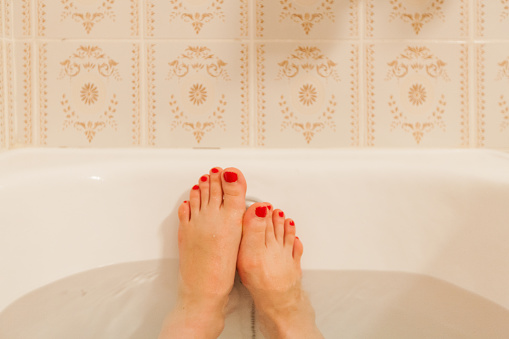Actress Gwyneth Paltrow Takes a Bath Every Night. Should You?
6 years ago | Sleep
By Joy Stephenson-Laws, JD, Founder
Actress and wellness guru, Gwyneth Paltrow, said she takes a bath every night.
“I fell in love with the ritual of it—lighting a candle and having a cup of tea or a whiskey, depending on my day,” she said, in this report.
“It’s non-negotiable. It’s just like, I do it every night.”
I wouldn’t pair my evening bath with whiskey (alcohol and caffeine are not good to consume before bedtime if you want to get as restful sleep as possible), but we all may want to consider adopting Paltrow’s non-negotiable evening bath routine.
According to a recent study, bathing one to two hours before bedtime in water of about 104-109 degrees Fahrenheit can “significantly improve your sleep,” according to a report discussing the study.
Don’t have a bath tub? Not to worry!
Researchers of the study say you can still reap the benefits by taking a hot shower. The researchers analyzed “thousands [5,322] of studies linking water-based passive body heating, or bathing and showering with warm/hot water, with improved sleep quality.”
This makes perfect sense to me, especially given our recent blog discussing thermography (heat therapy) as a pain management tool. Hot temperatures widen blood vessels, which usually promotes circulation and relaxes muscles. And if your muscles and body are relaxed, the better you are likely to sleep. And, of course, if you suffer from chronic pain, a hot bath or shower to alleviate that pain before bedtime will definitely help you get a good night’s rest.
The researchers analyzed water-based passive body heating in relation to:
- Sleep onset latency (how long it takes to transition from being fully awake to being asleep).
- Total sleep time.
- Sleep efficiency (amount of time spent asleep compared to the total amount of time in bed intended for sleep)
- Subjective sleep quality
What they saw is that bathing in hot water before bedtime sped up the time it took to fall asleep by an average of ten minutes.
Body temperature and your circadian rhythm.
In a nutshell, your body’s circadian rhythm is your body’s 24-hour sleep/wake cycle.
“Circadian rhythms are physical, mental, and behavioral changes that follow a daily cycle. They respond primarily to light and darkness in an organism's environment. Sleeping at night and being awake during the day is an example of a light-related circadian rhythm,” according to the National Institutes for Health (NIH).
Circadian rhythms may also influence hormone release, eating habits and digestion, body temperature and other important bodily functions.
Now this is going to sound very counterintuitive, but taking a hot bath or shower may actually cool your core body temperature and help you sleep.
Our body temperatures are two to three degrees Fahrenheit higher in the late afternoon/early evening than they are during sleep. Our body temperatures are actually at their lowest when we sleep. And then your body temperature rises as you start to wake up, like a “biological alarm clock wake-up signal.”
“Warm baths and showers stimulate the body's thermoregulatory system, causing a marked increase in the circulation of blood from the internal core of the body to the peripheral sites of the hands and feet, resulting in efficient removal of body heat and decline in body temperature. Therefore, if baths are taken at the right biological time—1-2 hours before bedtime—they will aid the natural circadian process and increase one's chances of not only falling asleep quickly but also of experiencing better quality sleep.”
Other ways you can be proactive about getting a good night’s rest?
Honestly, the short answer is to be as healthy as possible. For example, if you are overweight or obese, you will likely not sleep as well as you potentially could. And then there are some people that manage to regularly eat nutrient-void, processed foods and not gain weight, however this type of diet will likely still affect sleep quality.
You need to eat healthily, exercise regularly, avoiding smoking, drink alcohol and caffeine in moderation and manage stress as best as you can in order to get good sleep.
For more sleep tips including how to eat your way to better sleep, check out this pH Labs blog.
And finally, take a nutrient test to identify any nutritional imbalances such as magnesium, which could be disrupting your sleep. If a deficiency or imbalance is found, a competent healthcare professional can work with you on making the necessary dietary changes and recommend quality supplements where appropriate.
Enjoy your healthy life!
The pH professional health care team includes recognized experts from a variety of health care and related disciplines, including physicians, attorneys, nutritionists, nurses and certified fitness instructors. This team also includes the members of the pH Medical Advisory Board, which constantly monitors all pH programs, products and services. To learn more about the pH Medical Advisory Board, click here.







